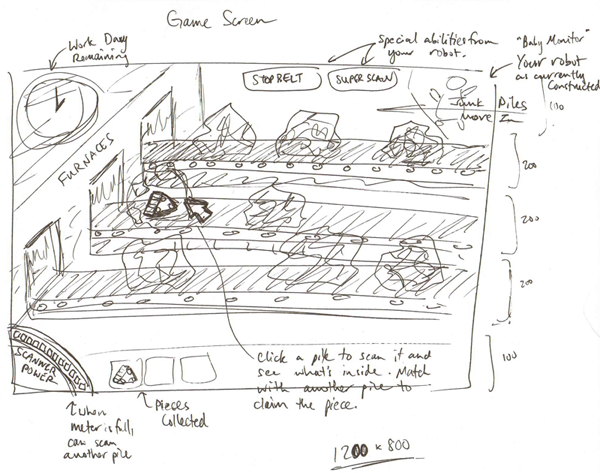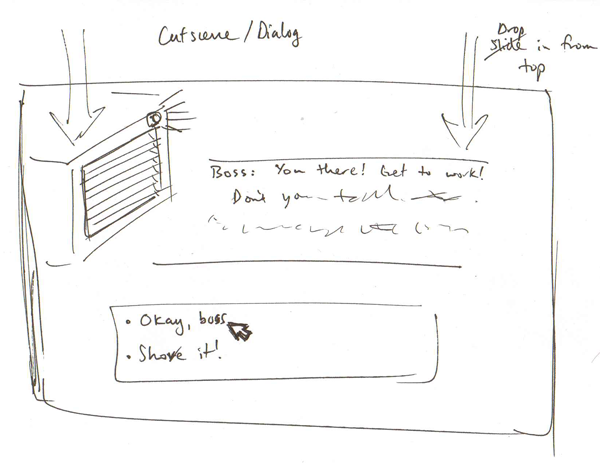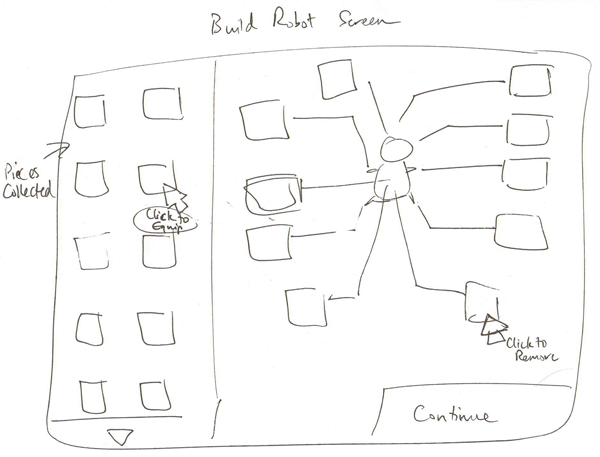Robogenesis After Action Report: part 2
This is part two in a series in which I discuss the creation of Robogenesis – my entry for Ludum Dare 28. This article will focus in detail on how I came up with the story, the gameplay concept, and how I feel about the results. (The previous article was more of a practical overview.)
Theme
I rushed home from work on Friday already feeling a bit frantic. By the time I booted my development PC to see the theme, I was half an hour behind. "You only get one." It was definitely not my favorite of the options I had been voting on. I was hoping for something more figurative, open to many different interpretations. Only getting "one" of something struck me as too restrictive, and I envisioned everyone implementing very similar games. (Thankfully I was in for a pleasant surprise when I saw the creativity of my fellow entrants!) I'm sure my initial struggle with the theme is why it had much more influence on the story and setting of my game than on the mechanics themselves.
This all threatened to set me off on a sour mood, but thankfully I was able to step away, clear my head, and
begin jotting down all the possible interpretations of the theme that I could. The natural question was "one
what?" – life, weapon, enemy, ability, friend, child – and modifiers like "one at a time?"
Something about "child" struck me as rich narrative ground. I'm something of a sucker for rich stories in games
so I aspire to lofty heights in that regard (perhaps too lofty). Anyone can slap together a Tetris clone, for
example, but a Tetris clone that could make you feel? That would be something magical.
Only getting one child is, after all, something that really happens in this world. (I'm looking at you, China.) And regardless of legal restrictions, some would-be parents struggle to be able to have one child. I'm not trying to make a grand political or philosophical statement here; I'm simply suggesting that it's a subject ripe with emotional potential. Many would consider having children to be the ultimate act of creation. With all of the hope and joy and pain inherent in such a creation bound up into a single child, a single chance, surely every one of life's hard decisions must feel that much harder. How must it feel to bid goodbye to your only child?
This was the germ of the theme for the game. With that feeling in mind I fleshed out the setting around it. My game was going to be set in a dingy, vaguely-post-apocalyptic future of a kind that would be familiar to any Sci-Fi fan. Your character is trapped in a desperate life, picking through the wastes of civilization to survive. Threatening your survival is an endless war made bleak by its lack of description, a very 1984-like "we have always been at war with Oceania" sort of war. Your job is to create the robotic soldiers that fight this war, scrabbling through garbage to find parts. Failure would mean imminent destruction at the hands of the enemy, so all hope for your life and the life of your fellow citizens is bound up in this one creation. Ultimately you would have to send it to war, but when that time came I wanted the player to feel attached to the robot that they had just been piecing together bit by bit. I planned to reveal in the final scene that you the player are a robot, one of a desperate civilization of sentient robots, helping to drive home the point that this robot is your child in a more literal sense.
Now this probably all seems very ambitious for a 48-hour game competition (and it turns out it was!) but I was trying to keep the time limit in mind as I painted with some fairly broad strokes here. I didn't hesitate to piggy-back on common Sci-Fi tropes for that very reason. For all my talk of creating rich stories, I wasn't trying to make people break down and cry at the end (I'm looking at you, To the Moon) but if I could get people to stop and think for a moment about the experience they'd just gone through, that would be Mission Accomplished in my book.
Gameplay
Now as you've probably noticed, none of what I've talked about so far really sounds like a game. I focused on things like setting, feeling, and tone before I had any good concept of the core gameplay. I strongly suspect that someone out there will admonish me for not putting the gameplay first, and it's hard to argue with that – the gameplay in Robogenesis is admittedly thin – but I'm not a veteran game designer and I'm just trying to find an approach that works for me. When I play games I most often identify with the feel of the game rather than the mechanics. I loved Castles (one of the first computer games I ever played) because I felt like a Medieval English Lord, not because I could try to min-max the most efficient laborer ratios.
That said of course, I needed something for the player to do to interact with this world I had just mapped out. I needed interaction to lift my narrative from a simple story to a story-driven-game. At the risk of trespassing briefly onto philosophical grounds, it is this interactivity which I think makes games truly unique as a storytelling medium. As a reader of literature, you experience a character, perhaps feeling what they feel, or seeing the world through their lens. As a player of games, you can make choices with a character. You inject yourself into the story, perhaps to grow as the story grows. Perhaps just to experience a world different from your own. I can't help but believe that reading or viewing a story is fundamentally different to our psyche from participating in a story. (A subject I will write more about another day, maybe.)
The basic gameplay elements that came out of my setting were "searching for parts" and "assembling a robot". The third unspoken element was me, or more specifically, knowing my limitations. Being very novice at this whole game development thing and operating under a time limit I knew I needed to keep the gameplay simple to keep it achievable. Puzzle games seemed a natural fit. A game like Memory (an old staple in video games!) fit well with the concept of searching for things. Having the junk piles scroll across the screen on conveyor belts would tie in with the industrial theme as well as provide extra challenge and urgency. So the core gameplay was simple: collect parts by making matches and use those parts to build your robot. The game would end when the robot was complete, allowing the final story scenes to unfold.
Design
By this point I was maybe an hour into the competition, just brain storming. A natural next step was to sketch out the game's screens. (I'll put some sample sketches at the end of the post.) I work really well with pen and paper. Not that I have great art skills, or anything, but something about having a pen in hand seems to keep my thoughts flowing more freely than staring at a computer screen. As I sketched, I would invent new features. These features would support the theme or provide a more rich experience. For example, my concept had a vast array of possible parts that could be found and assembled. Maybe you want jets or wheels on your robot instead of tractor treads. This started as a way to let the player customize and form an attachment with their robot, but bloomed into something else as well. After assembling your robot to a certain minimal point, it could assist you in searching the junk. If you fitted it with a special scanner computer, maybe you could scan piles faster. Or look at three piles at a time. This would have provided variety and deepen the interaction between the player and their creation.
By the time I felt happy with the sketches drawn and the features dreamt, I was maybe two or three hours into the competition and it felt like time to get something on the screen. As I began assembling art assets, I quickly realized I would have to start shedding features if I had any hope of finishing on time.
The cutting room floor
By the end I couldn't help but feel as though I had to cut the best parts of Robogenesis. Don't get me wrong, the fact that I produced anything remotely playable is a small marvel and I am immensely proud and happy with that. I don't want to trivialize anyone's effort who might not have this much to show for it. However being something of a perfectionist by nature, it's difficult for me to present Robogenesis in what feels like an unfinished state.
The story couldn't hit all the notes I wanted to hit in part because many of the gameplay elements that supported the story had to be cut. I simply ran out of time to try to create the "you're a robot, too" reveal scene. Some of the reviewers did mention some attachment to the robot – feedback I was delighted to receive – but I feel like that could have been stronger with some deeper interaction. A better art style and some music could have strengthened the experience of the setting.
And there were other more practical concerns as well: a common bit of feedback was that the delay after selecting two mis-matched piles felt awkward. This delay was intentional – to encourage memory over click-fest – but I had wanted to create an on-screen indicator of when your scanner was "recharged". I feel like this would have made the delay not only obviously intentional but something that made sense to the player.
I am certain that part of the "magic of Ludum Dare" is being forced to accept an unfinished product. No doubt there's a lesson in the idea that an unfinished product is better than one which is eternally on the verge of being finished. So from that perspective I am happy to share Robogenesis with all of you in its current form, warts and all. And from another perspective, having all these improvements waiting to be made is a little exciting. I hope I shall find the energy and the talent at some point in the future to make Robogenesis the game that I imagined it could be. At the very least I can say that Robogenesis is a game and not simply an idea. And Robogenesis 2 (or Robogenesis: Director's Cut?) – if it ever happens – will be better.


